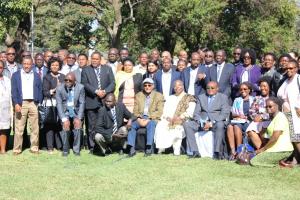Zambia hosts the Eastern and Southern Africa (ESA) review meetings on the status of implementation of immunisation and surveillance plans and the WHO performance accountability framework
Lusaka, 17 July 2017- The WHO Country Office in Zambia in collaboration with the Ministry of Health is hosting the immunisation and surveillance plans review and feedback meeting from 17-19 July 2017 and the review meeting on the status of implementation of the WHO performance accountability framework from 20-21 July. These meeting have been convened by the WHO Inter-country Support Team (IST) for Eastern and Southern Africa (ESA) following the development of surveillance and immunization improvement plans and the Standard Operating Procedures (SOPs) and Key Performance Indicators (KPIs) for the WHO performance accountability framework by countries. During this meeting, the countries will also conduct mid-year review of their operational Vaccine Preventable Diseases (VPDs) and surveillance plans. The overall aim of the meetings is to identify lessons learned and challenges in order to address them in the remaining months of the year.
Speaking at the official opening of the meeting, the director for Public Health at the Ministry of Health, Dr. Kennedy Malama who spoke on behalf of the Permanent Secretary emphasised the importance of strengthening national surveillance systems. He said that many African countries had attained polio free certification status and sustained annual core performance indicators at certification level. “These efforts are expected to be applied to other vaccine preventable diseases, hence the significance of this meeting” he said. He also called for strengthening of laboratories and emphasised the need to use surveillance data at the point of source in order to enhance decision making.
Speaking on behalf of the United Nations in Zambia, the Acting WHO Representative for Zambia, Dr. Custodia Mandlhate said that the immunization programme was a strong pillar for achieving the Sustainable Development Goal number three aimed at ensuring healthy lives and promoting well-being for all at all ages. She emphasised the importance of the targets aimed at reducing the global maternal mortality ratio to less than 70 per 100,000 live births and that of ending preventable deaths of newborns and children by reduce neonatal mortality to at least as low as 12 per 1,000 live births and under-5 mortality to at least as low as 25 per 1,000 live births. Dr. Mandlhate said that WHO together with UNICEF and other UN Agencies were supporting member states in building capacity to meet these goals through strengthening the health systems with improved human resources for health, health financing, service delivery, health information systems, medicines and technology and governance.
The meeting has brought together immunisation and vaccines development focal points, national surveillance officers, national routine immunisation officers, monitoring and evaluation officers and data managers from WHO Country Offices and laboratory technical officers responsible for polio and measles sample specimens. The participating countries are Botswana, Comoros, Eritrea, Kenya, Lesotho, Madagascar, Malawi, Mauritius, Mozambique, Namibia, Rwanda, Seychelles, South Africa, South Sudan, Swaziland, Tanzania, Uganda, Zambia and Zimbabwe.
Health Information and Promotion Officer
Tel: 255322 /255336, 255398, Cell: 097873976
Email: mweemban [at] who.int
Immunization Officer
Tel: 255322 /255336, 255398
Email: masumbup [at] who.int
